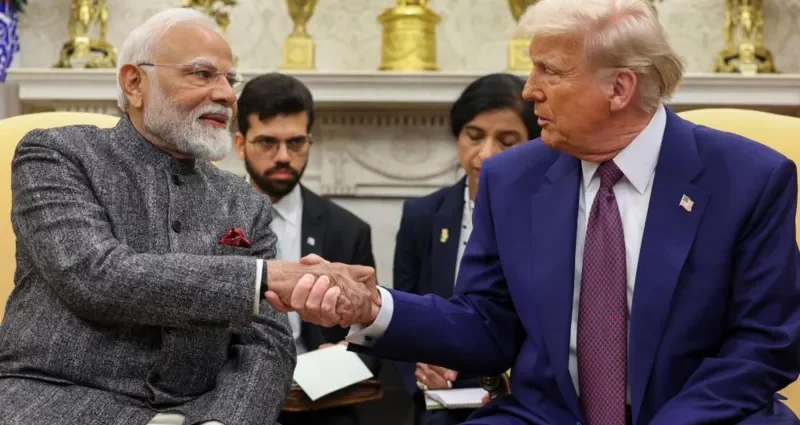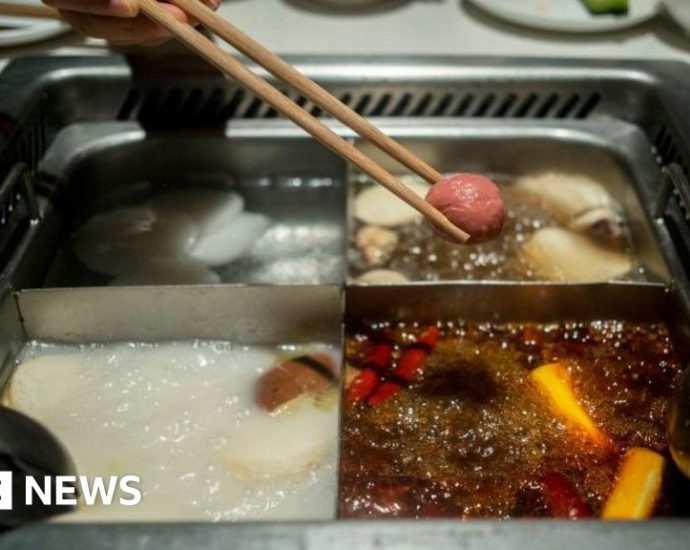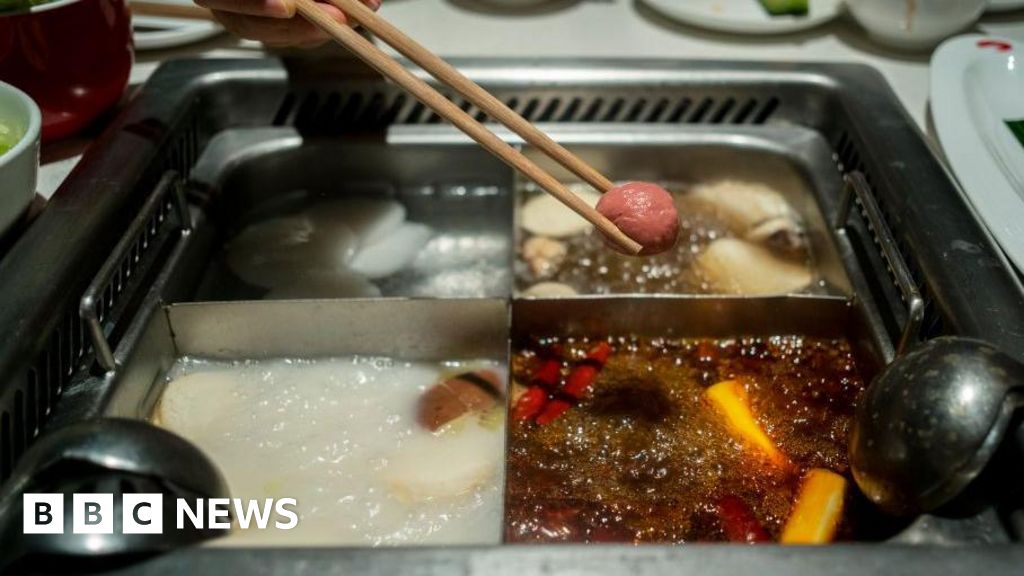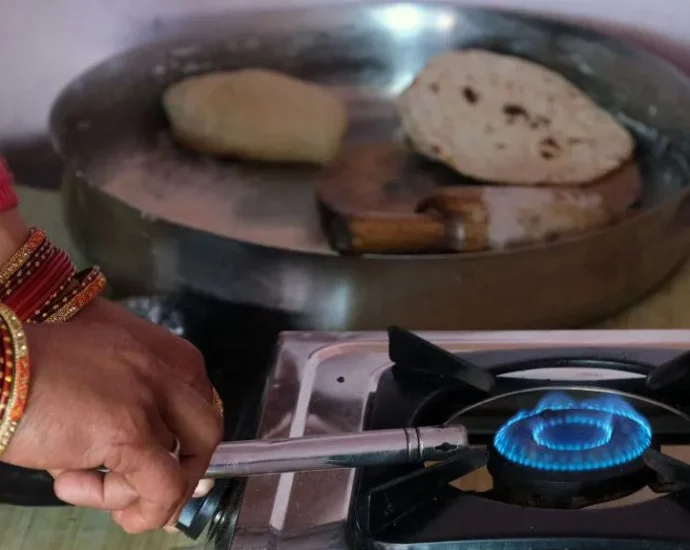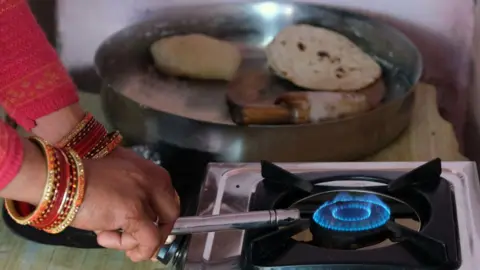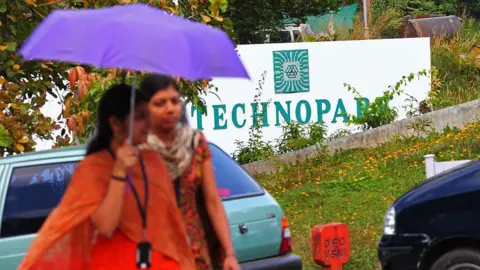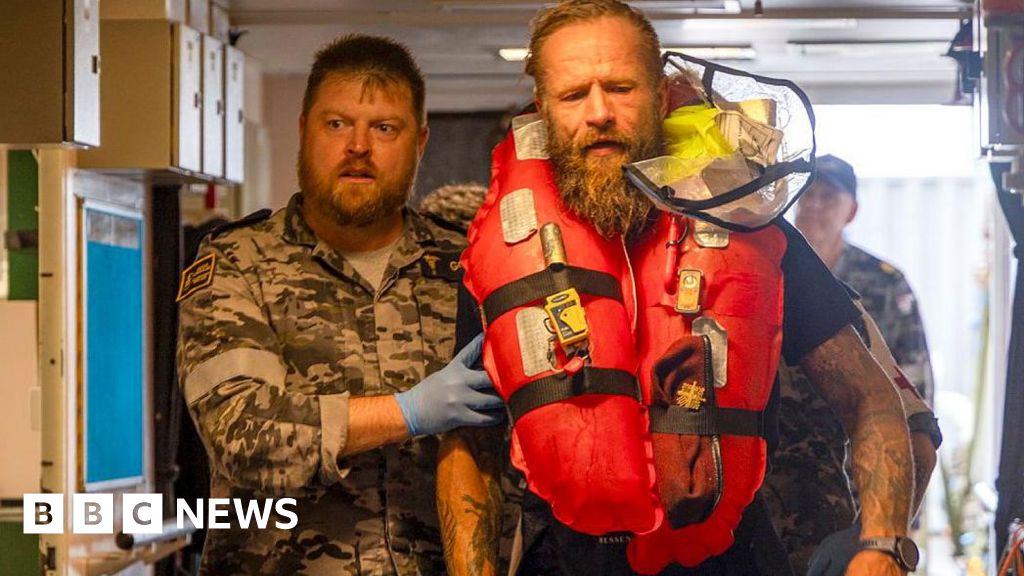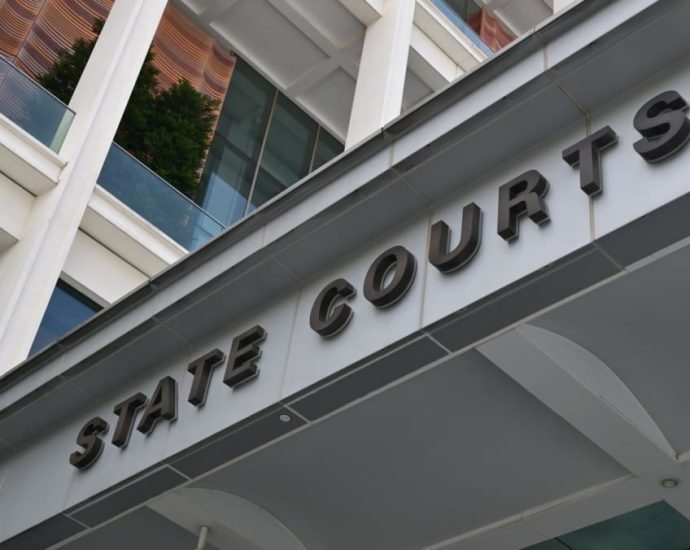Trump tariffs: Will import duty war push India to open its markets?
 Getty Images
Getty ImagesIndia has usually turned to economic reforms in times of distress, with the most famous example being 1991, when the country embraced liberalisation in the face of a deep financial crisis.
Now, with US President Donald Trump’s tit-for-tat tariff wars and the global trade upheaval that has followed, many believe that India finds itself at another crossroad.
Could this be a major opportunity for the world’s fifth largest economy to shed its protectionism and further open up its economy? Will India seize the moment, just as it did more than three decades ago, or will it retreat further?
Trump has repeatedly branded India a “tariff king” and a “big abuser” of trade ties. The problem is that India’s trade-weighted import duties – the average duty rate per imported product – are among the highest in the world. The US average tariff is 2.2%, China’s is 3% and Japan’s is 1.7%. India’s stands at a whopping 12%, according to data from the World Trade Organization.
High tariffs increase costs for companies dependent on global value chains, hindering their ability to compete in international markets. They also mean that Indians pay more on imported goods than foreign consumers. Despite growing exports – primarily driven by services – India runs a significant trade deficit. However, with India’s share of global exports at a mere 1.5%, the challenge becomes even more urgent.
The jury is out on whether Trump’s tariff war will help India break free or double down on protectionism. Narendra Modi’s government, often criticised for its protectionist stance, seems to have shifted gears in recent years.
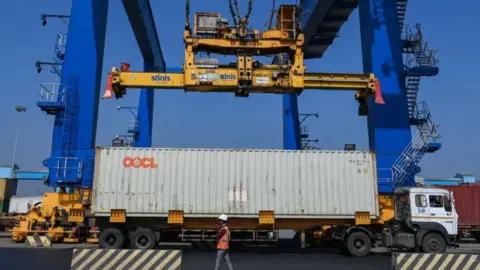 Getty Images
Getty ImagesLast month, ahead of Prime Minister Modi’s meeting with Trump in Washington, India unilaterally lowered tariffs on Bourbon whiskey, motorcycles and some other US products.
Commerce Minister Piyush Goyal has made two trips to the US to discuss a potential trade deal, following Trump’s threatened retaliatory tariffs, looming on 2 April. (Citi Research analysts estimate India could lose up to $7bn annually from reciprocal tariffs, primarily affecting sectors like metals, chemicals and jewellery, with pharmaceuticals, automobiles and food products also at risk.)
Last week, Goyal urged Indian exporters to “come out of their protectionist mindset and encouraged them to be bold and ready to deal with the world from a position of strength and self-confidence”, according to a statement from his ministry.
India is also actively pursuing free trade deals with several countries, including the UK and New Zealand, and the European Union.
In an interesting turn of events, homegrown telecoms giants Reliance Jio and Bharti Airtel have teamed up with Trump ally Elon Musk’s SpaceX to launch satellite internet services via Starlink in India. The move surprised analysts, especially after Musk’s recent clashes with both companies, and came as US and Indian officials negotiate the trade deal.
India’s rapid growth from the late 1990s to the 2000s – 8.1% between 2004-2009 and 7.46% from 2009-2014 – was in large part driven by its gradual integration into global markets, particularly in pharmaceuticals, software, autos, textiles and garments, alongside a steady reduction in tariffs. Since then, India has turned inwards.
Many economists believe that protectionist policies over the past decade have undermined Modi’s Make in India initiative, which prioritised capital- and technology-intensive sectors over labour-intensive ones like textiles. As a result, it has struggled to boost manufacturing and exports.
High tariffs have also fostered protectionism in several Indian industries, discouraging investments in efficiency, according to Viral Acharya, a professor of economics at New York University Stern School of Business.
This has allowed “cosy incumbents” to gain market power by consolidating their positions without facing much competition. As Mr Acharya, a former central banker, noted in a paper by Brookings Institution, restoring industrial balance in India requires “reducing tariffs to increase the country’s share of global goods trade and reduce protectionism”.
With India’s tariffs already higher than those of most countries, further increases could be especially damaging.
“We need to boost exports and a tit-for-tat tariff war won’t help us. China can afford this strategy due to its massive export base, but we can’t, as we hold only a small share of the global market, Rajeshwari Sengupta, an associate professor of economics at Mumbai-based Indira Gandhi Institute of Development Research, said. A trade conflict could hurt us more than others,” she added.
 Getty Images
Getty ImagesIn light of this, India finds itself at a crossroad. As the world undergoes a major shift, India has a “unique opportunity to shape a new vision” for global trade, says Aseema Sinha, a trade expert at Claremont McKenna College.
By lowering protectionist barriers in South Asia and strengthening ties with Southeast Asia and the Middle East, India has the chance to lead in shaping a new trade vision, positioning itself as a key player in a “re-globalised” world, Ms Sinha, author of Globalising India, says.
“By reducing tariffs, India could become the regional and cross-regional magnet for trade and economic activity, drawing in varied powers in its orbit,” she adds.
That could help India create the jobs it desperately needs at home. Agriculture, which makes up 15% of its GDP, accounts for a whopping 40% of employment, reflecting extremely low productivity. Construction remains the second-largest employer, absorbing casual daily workers.
India’s challenge isn’t in expanding its thriving service sector, which already makes up nearly half of total exports, but in dealing with the large pool of unskilled workers who lack the basic skills needed for service jobs.
“While high-end services are thriving, the majority of the workforce remains uneducated and underemployed, often relegated to construction or informal jobs. To provide meaningful employment to millions entering the workforce each year, India must ramp up its manufacturing exports, as relying solely on services won’t address the needs of the unskilled labour force,” says Ms Sengupta.
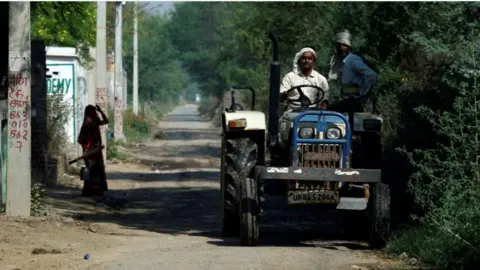 Reuters
ReutersOne concern is that reducing tariffs could lead to dumping, where foreign companies flood the market with cheap goods, potentially harming domestic industries.
According to Ms Sengupta, India’s ideal approach to trade would involve a “universal reduction” in import tariffs, as it currently has some of the highest tariffs among its trading partners.
However, there is a caveat: China’s trade struggles, particularly with the US due to the ongoing trade war, could lead to Chinese dumping in India in the “short run”.
“To protect against this, India can use non-tariff barriers against China but only against this one country and only in cases of proven dumping. Barring that, it is in India’s interest to do a wholesale slashing of tariffs,” she says.
There’s also a growing concern that India may be overcompensating in its efforts to flatter the US.
Ajay Srivastava, founder of the Global Trade Research Initiative (GTRI), believes that India’s tendency to soften trade policies “based on rhetoric rather than economic pressure” shows a lack of assertiveness in global trade talks.
If this trend continues, he says, India may end up making even more compromises in its trade deal with the US, further “eroding its bargaining power”.
“In comparison to other major economies, India’s pre-emptive surrender on multiple trade fronts – without the US imposing a single country-specific tariff – makes it appear exceptionally vulnerable to pressure tactics.”
The broader consensus seems to be that India should capitalise on what could be the unintended consequences of Trump’s tariff wars. Pranjul Bhandari, chief India economist at HSBC, believes that “potential US tariffs may have become a catalyst for reforms.“.
“If supply chains are rejigged again during the second Trump presidency due to higher tariffs on large exporters, and the world looks for new producers, India may get a second chance,” she writes.
Creating jobs that manufacture goods for the world won’t be easy. India has largely missed the bus on low-end, unskilled factory work – jobs China dominated for decades. Automation is taking over. Without deeper reforms, India risks being left behind.

